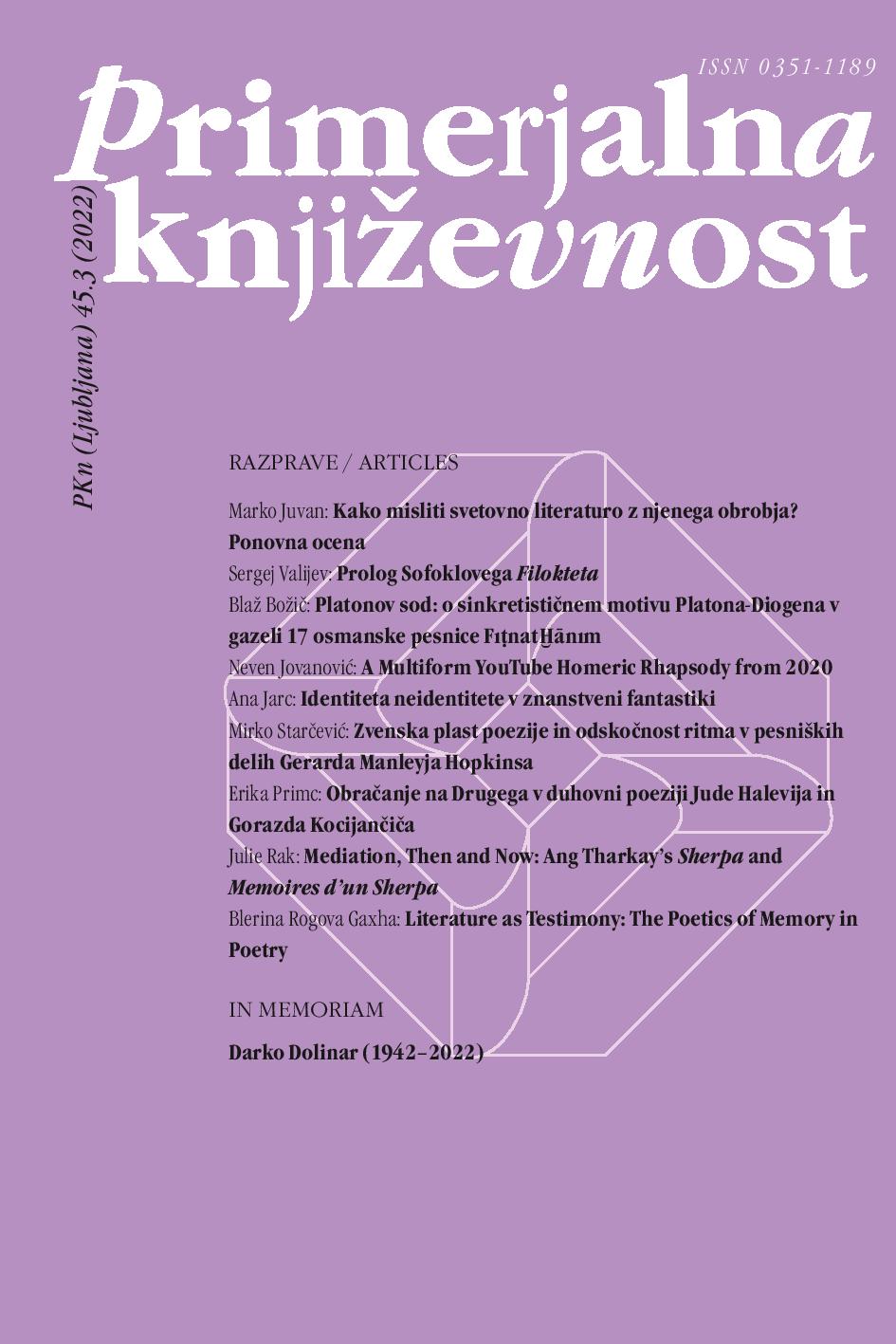Addressing the Other in the Religious Poetry of Judah Halevi and Gorazd Kocijančič
DOI:
https://doi.org/10.3986/pkn.v45.i3.07Keywords:
literature and religion, spiritual poetry, mystical poetry, Halevi, Judah, Kocijančič, Gorazd, naming God, speech structure of prayerAbstract
Experiencing the Transcendental—which surpasses our ability of feeling, imagination, our own selves—is an ancient experience. Parallel to this experience, attempts for its articulation were developing—with which the man soon found out that he is dealing with the ineffable. But he did not give it up. Religious literature which is perhaps trying to put the ineffable into words most directly, has been present since the beginnings of literature—and is just as relevant today. This article deals with two instances from its journey: the poetry of the medieval Jewish poet Judah Halevi and the contemporary Slovenian poet Gorazd Kocijančič. It is based on Kocijančič’s translation of a selection of Halevi’s poems (1997) and three Kocijančič’s poetry collections: Tvoja imena (2000, Your Names), Certamen spirituale (2008) and Primož Trubar zapušča Ljubljano (2012, Primož Trubar Is Leaving Ljubljana). Based on their poetry, it shows how that which pushes a religious poem into being and is at the same time its key moment—addressing the Other—is reflected in the poem itself. Firstly, the article describes how the poets relate to the tradition of mystical poetry, as the discussed aspect of poetry is most directly present in it. It then discusses how the lyrical subject addresses the o(O)ther, God—by using names and the structure of the poem itself, which always addresses s(S)omeone. We will see that the authors describe the same experience, despite the historical, cultural, and ultimately religious distance between them.
References
Dionizij Areopagit. »O mističnem bogoslovju«. <em>Zbrani spisi</em>. Uvod, prev. in op. Gorazd Kocijančič. Ljubljana: Društvo Slovenska matica, 2008. 157–175.
Dionizij Areopagit. »O nebeški hierarhiji«. <em>Zbrani spisi</em>. Uvod, prev. in op. Gorazd Kocijančič. Ljubljana: Društvo Slovenska matica, 2008. 323–400.
Grgič, Matejka. »Jezik kot lógos: vpliv novoplatonistične filozofije na Dionizija Areopagita«. <em>Dionizij Areopagit in evropsko izročilo</em>. Ur. Gorazd Kocijančič in Vid Snoj. Ljubljana: Slovenska matica, 2011. 83–94.
Halevi, Juda ben Samuel. <em>Juda Halevi</em>. Izbor in prev. Gorazd Kocijančič. Ljubljana: Mladinska knjiga, 1997.
Kocijančič, Gorazd. <em>Certamen spirituale</em>. Ljubljana: Beletrina, 2008.
Kocijančič, Gorazd. <em>Primož Trubar zapušča Ljubljano</em>. Ljubljana: Beletrina, 2012.
Kocijančič, Gorazd. »Spremna beseda«. <em>Juda Halevi</em>. Avtor Halevi, Juda ben Samuel. Izbor in prev. Gorazd Kocijančič. Ljubljana: Mladinska knjiga, 1997. 105–113.
Kocijančič, Gorazd. <em>Tvoja imena</em>. Ljubljana: Društvo SKAM, 2000.
Scholem, Gershom. <em>Poglavitni tokovi v judovski mistiki</em>. Prev. Vid Snoj. Ljubljana: Nova revija, 2003.
Snoj, Vid. »Božja imena po Dioniziju«. <em>Dionizij Areopagit in evropsko izročilo</em>. Ur. Gorazd Kocijančič in Vid Snoj. Ljubljana: Slovenska matica, 2011. 95–107.
Snoj, Vid. »Svetovna literatura na ozadju Drugega«. <em>Od drugega do Drugega</em>. Ljubljana: KUD Logos, 2007. 141–159.
<em>Sveto pismo stare in nove zaveze: slovenski standardni prevod</em>. Ljubljana: Svetopisemska družba Slovenije, 1996.
Širca, Alen Albin. <em>Teopoetika: študije o krščanskem mističnem pesništvu</em>. Ljubljana: KUD Logos, 2007.
Truhlar, Vladimir. <em>Leksikon duhovnosti</em>. Celje: Mohorjeva družba, 1974.


